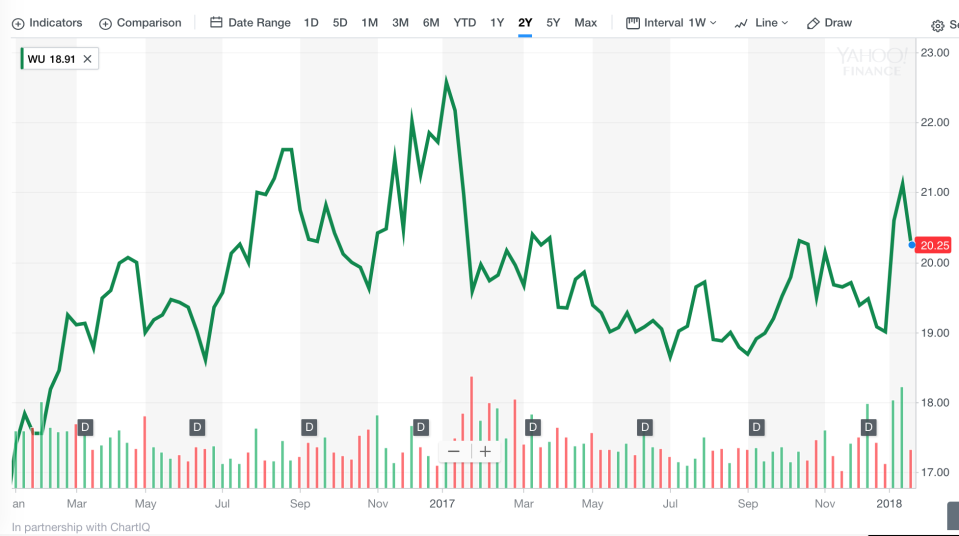Bitcoin was supposed to kill Western Union — that hasn't happened
Bitcoin was envisioned as a “peer-to-peer electronic cash system” in Satoshi Nakamoto’s original 2008 white paper, and one of its biggest appeals was frictionless international payments. Bitcoin promised shorter transfer times and lower transfer fees than you’d get at Western Union or another money transfer business, the de facto option for sending money abroad.
But 10 years later, Western Union has been unfazed and unaffected by bitcoin.
In fact, profits at the world’s largest money transfer company are up: for Q3 2017 Western Union reported a 13% year-over-year increase in earnings per share, beating analyst expectations.

Considering that Western Union has been around since 1851, it may look like an old-guard, outdated company ripe for disruption, rooted in brick and mortar. It still has 550,000 physical locations globally (a staggering figure, but remember that many of these are small counters inside a grocery store).
But the company has quietly gone more digital, and specifically more mobile. Western Union integrated with new mobile pay options like Apple Pay, Facebook Messenger, and Tencent’s WeChat Pay. And as Fortune reported in November, more than 60% of Western Union’s digital transactions now originate from a mobile device. Its rails handle $150 billion in transactions per year.
None of those transactions involve cryptocurrencies; Western Union doesn’t allow them.
In December, the company made a little bit of noise in the bitcoin world when a Reddit user posted the message that Western Union gave in blocking a wire payment sent to the bitcoin exchange Kraken: “Please be advised that we have determined your transaction is related to cryptocurrencies. This is one of the purposes of trading that we do not allow as per our internal regulations, which is why the transaction cannot be processed and the funds will be returned back to your bank account in full.” (Western Union declined to comment for this story beyond confirming that it does not allow cryptocurrency transactions.)
This wasn’t the first time that the money transfer giant has targeted cryptocurrency. In February 2017, Western Union posted a video interview with its CTO David Thompson to its corporate blog, called “Is bitcoin a viable currency?”
Surprise: Western Union’s opinion is “no.”
Thompson’s description of bitcoin, in which he compares it to a bag of corn, raised some eyebrows in the cryptocurrency community: “Think of [cryptocurrencies] as a bag of corn, or silver—a commodity that you can exchange for a service or a product,” Thompson said. “Cryptocurrencies confuse a lot of people because they aren’t fiat currencies… So for example, if you want to go get a car wash, I don’t think your car wash is going to accept a commodity like a bag of corn. They want fiat currency.”
Bitcoin believers might retort: Of course your car wash doesn’t accept bitcoin yet. And maybe it never will, but that’s not the point anymore. The potential use cases of bitcoin have changed so much since its inception that “digital currency” or “cryptocurrency” may no longer be an appropriate moniker. Think of bitcoin and other coins (ether, litecoin, etc.) instead as “digital assets” or “digital tokens.”
It doesn’t help bitcoin’s case that as activity on the bitcoin blockchain has increased, transaction times have slowed and fees have gone up.

Would Western Union ever change its stance on cryptocurrencies? Thompson answered that clearly: “We as a company would not be operating in cryptocurrency until it became regulated, and there would be a need for regulation over cross-border movement or a cross-border compliance structure.” It is a common misconception that bitcoin is completely unregulated, but it is certainly not regulated to the extent Western Union or other mainstream financial companies would like before touching it.
Coinbase cofounder Fred Ehrsam offered CoinDesk his opinion on Western Union and bitcoin back in 2013: “They have innovator’s dilemma. It’s hard for them to move on bitcoin because they have all this massive infrastructure invested, with physical locations and agents everywhere.”
On the other hand, Western Union stock popped last week on a rumor, still unconfirmed by Western Union, that the company plans to adopt Ripple’s blockchain payment network and use its XRP token. (XRP ended 2017 up 32,300% for the year.)
Thompson, in his video interview, also offers this take: “In our current ecosystem, say the United States, there’s a very limited use for cryptocurrencies.” For now, he isn’t wrong: people are buying these coins as speculative investments, to hold in the hopes that the price goes up. It has become a buying mania, but in all the excitement, the uses of the technology behind each coin are getting lost. (That said, it is not at all the case that “bitcoin is dead,” as the CEO of TransferWise, another money transfer company, claimed to Yahoo Finance in 2016.)
The general thinking in the financial world, for now, is that bitcoin poses no big threat to traditional money transfer companies. That could still change—remember that blockchain, the decentralized ledger technology that underpins bitcoin and has Wall Street so excited, is still extremely new and nascent—but for now, Western Union isn’t blinking.
—
Daniel Roberts covers bitcoin and blockchain at Yahoo Finance. Follow him on Twitter at @readDanwrite.
Read more:

